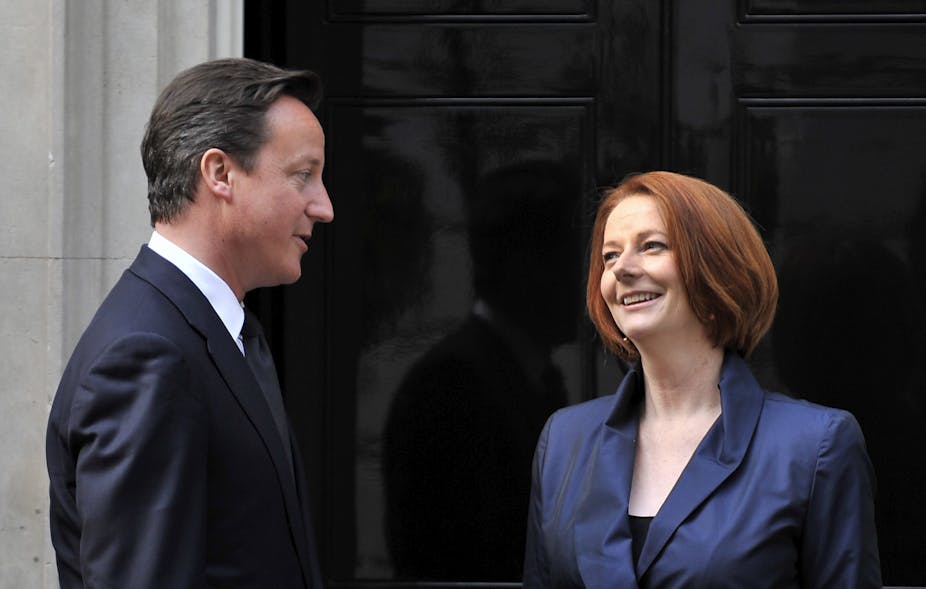British divisions over Europe have something of a “groundhog day” feel to them, even if the current Conservative rift seems like a particularly damaging instance. The stakes are high: the United Kingdom’s ongoing membership of the European Union (EU) is far from assured.
Australians could be forgiven for scratching their heads about what a British exit from the EU might mean. It’s unclear what the knock-on effect for Australia might be, or even if there is any. But at least the question is not a new one: we’ve been here before.
In 1975, British membership of the then-European Economic Community (EEC) seemed dire from an Australian view. It caused panic in some quarters, mainly related to the changes in markets for Australian agricultural exports. As it happened there was more than a decade between the original application in 1961 and Britain’s eventual accession to the EEC in 1973.
Once Britain was in, the UK-Australia Trade Agreement (UKATA) was duly cut, and the international implications of the EEC’s Common Agricultural Policy brought uneasy relations between Australia and the EEC that lasted for some decades.
But Australia adjusted to British membership – and fast. Nor was it a one-way street: the rapid diversification of Australian export markets from the 1950s owed something to the British decision to join Europe.
However, as British officials discovered in 1974 when they canvassed a return to the “traditional” bilateral trade relationship, the Australian government was not convinced of the benefits of a British exit from Europe even then. Australian prime minister Gough Whitlam stated that relations between Australia and the UK would remain close either way, but that Australia saw no special advantages in Britain leaving the EEC.
For Whitlam, European integration was one of “the great forward marches of history”. He thought Britain should stop being ambiguous on the matter and realise on which side its historical bread was buttered, firmly of the opinion that “all of this shilly-shallying was ended”.
In May-June 1975 Britons did that very un-British thing and held a referendum, borrowing from Australian practice and experience. But there was no constitutional mechanism to trigger such a device. Rather the decision was a political one, designed to push the decision onto the electorate and prevent the Labour Party from splitting over the issue. The results came through on 6 June; 2:1 in favour of staying in.
But the majority was illusory. Most people that voted to stay in did so because they felt that getting out was too hard, and that in fact – despite the recourse to the first UK-wide referendum in British history – they had little choice.

Some four decades later, the EU is a major trade partner for Australia. The fine print of the economic relationship reveals that a large proportion of this trade relates to the British connection, particularly in services and investment. But the observation obscures Australia’s increasingly diverse interests in an enlarging EU.
It also diverts attention from the fact that the EU is now a major player in international trade. The collective voice of the 27 member states (soon to be 28 when Croatia accedes on July 1 this year) is crucial to hope of any multilateral deal agreed at the World Trade Organisation (WTO).
The EU’s bilateral agreements around the globe will increasingly impact Australia too – none more so than the proposed Transatlantic Trade and Investment Partnership, announced in February. There are calls from industry and academia for Australia to seek a comparable deal with the EU.
Considering this, it’s hard to see how an EU without the UK benefits Australia. Perhaps Australia could negotiate a new UKATA, and pursue relations with the EU as we have to date. There might be benefits to some industries, but the likelihood is that any British government exiting the EU would try to maintain as many single market privileges it could. It is questionable how much British trade policy might be realigned. At the same time, the Australian case to be included as a possible EU free trade agreement partner is almost certainly undermined.
The UK is likely stronger inside the EU than outside it. The EU itself may be weakened by the exit of a prominent member and other member states may follow. European integration has not always suited Australian interests, but it does not mean that disintegration suits us now.
What matters now is that the EU recovers from the Euro-crisis and limits the international damage, and that Australia and the EU consolidate their common ground in organisations such as the WTO and the G20.
If asked, Australian politicians can be expected to point out that the decision on EU membership is a matter for Britain. Fair enough. But before it gets a foothold, we might as well put a stop to the argument that a British exit would result in clear gains for Australia. On balance, Australia would probably rather they stopped “shilly-shallying”.

